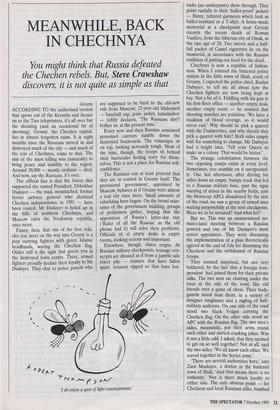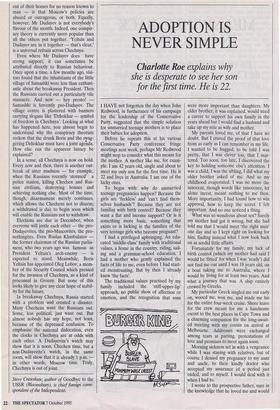MEANWHILE, BACK IN CHECHNYA
You might think that Russia defeated
the Chechen rebels. But, Steve Crawshaw
discovers, it is not quite as simple as that
Grozny ACCORDING TO the authorised version that spews out of the Kremlin and thence on to the Tass teleprinters, it's all over bar the shouting (and an occasional bit of shooting). Grozny, the Chechen capital, lies in almost forgotten ruins. It is eight months since the Russians moved in and destroyed much of the city — and much of the rest of Chechnya, come to that. The aim of the mass killing was (naturally) to bring peace and stability to the region. Around 30,000 — mostly civilians — died. And now, say the Russians, it's over.
The official line is that the forces that supported the ousted President, Dzhokhar Dudayev — the mad, moustached, former Soviet airforce general who declared Chechen independence in 1991 — have been routed. Mr Dudayev is holed up in the hills of southern Chechnya, and Moscow rules the breakaway republic, once more.
Funny, then, that one of the first vehi- cles you meet on the way into Grozny is a jeep carrying fighters with green Islamic headbands, waving the Chechen flag. Odder still is the sight that greets you in the destroyed town centre. There, armed fighters proudly declare their loyalty to Mr Dudayev. They chat to police patrols who are supposed to be loyal to the old-new rule from Moscow; 23-year-old Mahomed — baseball cap, jeans jacket, kalashnikov — loftily declares, 'The Russians don't bother us, at the present time.' Every now and then Russian armoured personnel carriers rumble down the destroyed boulevards. The conscripts sit on top, looking nervously tough. Most of the time, though, the troops sit behind their barricades feeling sorry for them- selves. This is not a place for Russian self- confidence.
The Russians can at least pretend that they are in control in Grozny itself. The provisional 'government', appointed by Moscow, behaves as if Grozny were almost a real city once more. Small amounts of rebuilding have begun. On the broad stair- cases of the government building, groups of petitioners gather, hoping that the appointees of Russia's latter-day tsar (`Ruler of all the Russias' as the old phrase had it) will solve their problems. Officials sit at empty desks in empty rooms, looking serious and important.
Elsewhere, though, chaos reigns. At Russian military checkpoints, teenage con- scripts are dressed as if from a jumble sale reject pile — trainers that have fallen apart, trousers ripped so that bare but- do enjoy a spot of light entertainment.' tocks (no underpants) show through. They point ruefully to their 'bullet-proof jackets — flimsy, tattered garments which look as bullet-resistant as a T-shirt. A home-made memorial at a checkpoint near Grozny records the recent death of Roman Vasiliev, from the Siberian city of Omsk, at the ripe age of 20. Two sweets and a half- full packet of Camel cigarettes lie on the memorial, in accordance with the Russian tradition of putting out food for the dead.
Chechnya is now a republic of listless- ness. When I entered the battered police station in the little town of Shah, south of Grozny, I expected the police chief, Ruslan Dabuyev, to tell me all about how the Chechen fighters are now being kept at bay. Not a bit of it. Fiddling with his gun in his first-floor office — another empty desk, another empty room — he insisted that shooting matches are pointless. 'We have a tradition of blood revenge, so it would never end.' Why should he pick a quarrel with the Dudayevites, and why should they pick a quarrel with him? Both sides simply wait for something to change. Mr Dabuyev had a bright idea. 'Tell your Queen to make us a colony. That would be better.'
The strange cohabitation between the two opposing camps exists at every level. Sometimes, you stumble on it unexpected- ly. One hot afternoon, after driving for miles down an empty, bumpy track that led to a Russian military base, past the signs warning of mines in the nearby fields, past the blown-up APCs abandoned by the side of the road, we saw a group of armed men waiting purposefully at the next checkpoint. Were we to be arrested? And what for?
But no. This was an unannounced no- man's-land meeting between a Russian general and one of Mr Dudayev's most senior appointees. They were discussing the implementation of a plan theoretically agreed at the end of July for disarming the Chechens and the withdrawal of Russian troops.
They seemed surprised, but not very bothered, by the fact that a foreign kore- spondent had joined them for their private talks. The two men sat chatting under the trees at the side of the road, like old friends over a game of chess. Their body- guards stood near them, in a variety of designer sunglasses and a ragbag of half- military uniforms. On one side of the road stood two black Volgas carrying the Chechen flag. On the other side stood an APC with the Russian flag. The two men's aides, meanwhile, put their arms round each other and started cracking jokes. Was it not a little odd, I asked, that they seemed to get on so well together? Not at all, said the two aides. 'We all know each other. We served together in the Soviet army.'
'There are several authorities here,' says Zaor Musluyev, a doctor in the battered town of Shall.. 'And that means there is no authority.' Nor is there much loyalty to either side. The only obvious point — for Chechens and local Russians alike, bombed out of their homes for no reason known to man — is that Moscow's policies are absurd or outrageous, or both. Equally, however, Mr Dudayev is not everybody's flavour of the month. Indeed, one conspir- acy theory is currently more popular than all the others put together. `Yeltsin and Dudayev are in it together — that's clear,' is a universal refrain across Chechnya.
Even where Mr Dudayev does have strong support, it can sometimes be attributed directly to Russian behaviour. Once upon a time, a few months ago, visi- tors found that the inhabitants of the little village of Samashki were less than enthusi- astic about the breakaway President. Then the Russians carried out a particularly vile massacre. And now — hey presto! — Samashki is fervently pro-Dudayev. The village centre is plastered with banners carrying slogans like `Dzhokhar — symbol of freedom in Chechnya'. Looking at what has happened here, you almost begin to understand why the conspiracy theorists reckon that the drunk Boris and the swag- gering Dzhokhar must have a joint agenda. How else can the apparent lunacy be explained?
In a sense, all Chechnya is now on hold. Every now and then, there is another out- break of utter madness — for example, when the Russians recently 'stormed' a police station, killing Chechen and Rus- sian civilians, destroying houses and achieving nothing else. Most of the time, though, disarmament merely continues, which allows the Chechens not to disarm; a withdrawal is due to begin soon which will enable the Russians not to withdraw.
Elections are due in December, when everyone will jostle each other — the pro- Dudayevites, the pro-Muscovites, the pro- nothingites. Even Ruslan Khasbulatov — the former chairman of the Russian parlia- ment, who two years ago was famous as President Yeltsin's arch-enemy — is expected to stand. Meanwhile, Boris Yeltsin has appointed Oleg Lobov, a mem- ber of the Security Council which pressed for the invasion of Chechnya, as a kind of proconsul in Grozny. But none of this looks likely to give any clear hope of stabil- ity for the future.
In breakaway Chechnya, Russia started with a problem and created a disaster. Many Chechens want the Russians out. Some, less political, just want out. But almost nobody has any hope, not least, because of the depressed confusion. To emphasise the national dislocation, even the clocks in Chechnya are at odds with each other. A Dudayevite's watch may show that it is noon, Chechen time, but a non-Dudayevite's watch, in the same room, will show that it is already 1 p.m. — in other words, Moscow time. Truly, Chechnya is out of joint.
Steve Crawshaw, author of Goodbye to the USSR (Bloomsbury), is chief foreign corre- spondent of the Independent.











































































 Previous page
Previous page